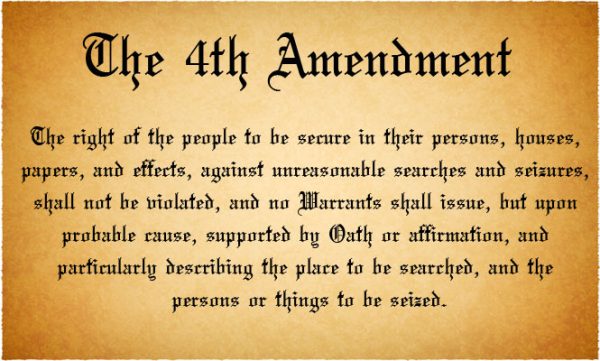One can take a deep breath when scrolling through their social media feed knowing that they are protected and being closely surveilled by government authority. With how easy it is for us to bump into sketchy people in the age of the internet, it is crucial that we are safe from every possible criminal and terrorist out there. And it is the massive government surveillance apparatus, spanning countless countries and using the most advanced spying, that keeps us safe.
There are some people who don’t understand this safety and bemoan the cries of the Fourth Amendment: citizens must be protected from “unreasonable searches and seizures.” Ah, the Fourth Amendment, that pesky little thorn in the side of national security enthusiasts. Well, allow me to present an ode to what I think is an incredibly useless Constitutional amendment and should’ve never been written: the Fourth Amendment.

Why, you may ask, have I chosen to champion the Fourth Amendment as the crown jewel of constitutional “brilliance”? Well, prepare to be dazzled by the sheer audacity of a provision that grants every Tom, Dick, and Harry the right to privacy in their own homes.
The right to privacy? The right to protection from any “searches” or “seizures” by the federal government? How silly. The Fourth Amendment is simply unreasonable for two reasons: it isolates us from the protections of the federal body in power and it clearly cannot be upheld in today’s digital age.
The Fourth Amendment clearly serves to do the opposite of securing liberty: it effectively bars us from federal protection and surveillance under the supposed guise of protecting individual rights. Because, clearly, nothing says “peace of mind” like knowing that every click, scroll, and swipe is being monitored by benevolent overlords in the name of national security. Who needs personal autonomy when you can have constant surveillance to keep you safe and sound? After all, ignorance is bliss, and what could be more blissful than living in a perpetual state of surveillance-induced paranoia?
It’s not just about surveillance for our protection. The Fourth Amendment prevents us from having security, even in our own homes. The rise of urban crime and our nation’s drug crisis can be solved very easily if we stop taking this seemingly “important” Fourth Amendment so seriously.
Simply, we must have personal FBI agents in everyone’s house so that we know we are always, always, protected from these threats. I mean, who wouldn’t want a friendly government agent peering over their shoulder while they brush their teeth or binge-watch the latest reality TV show? It’s like having a personal bodyguard who also doubles as a nosy neighbor. And let’s not forget the joys of living in your house, where cameras are on every corner and microphones in every device to ensure that our Big Brother government is always watching.

It’s quite obvious now that the Fourth Amendment is a staunch barrier to societal safety whether it be in individual homes, out on the streets, or on the Internet. But wait, there’s more. The Fourth Amendment is inherently paradoxical because of our increasingly interconnected world. Modern Fourth Amendment jurisprudence is a confusing muddle, and it is sorely challenged by advances in information technology.
Supreme Court Justice Brandeis had understood the surveillance capabilities enabled by today’s information and communications technologies. “Ways may someday be developed,” he wrote, “by which the Government, without removing papers from secret drawers, can reproduce them in court, and by which it will be enabled to expose to a jury the most intimate occurrences of the home” (Harper, 2017).
There are many people today who don’t understand this “muddle” and point to the Fourth Amendment as a way to protect digital rights. It’s clear that this is simply becoming unfeasible in society today. The progress of technology has led to increased encroachment on people’s daily lives, making it increasingly challenging to safeguard their digital rights. So, rather than waste resources trying to uphold the Fourth Amendment, let’s embrace a society without it. After all, what is not to love about having your every online move tracked and monitored by tech giants and government agencies alike. If we protect our privacy, how can we have targeted ads and personalized recommendations?
And speaking of digital rights, let us not forget the landmark case of Carpenter v. United States (2018), where the Supreme Court ruled that demanding seven days of location information from a cell phone provider without a warrant violated the Fourth Amendment. The case centered around Timothy Carpenter, who was convicted of armed robberies in Michigan and Ohio. The prosecution had used cell phone records obtained without a warrant to place Carpenter near the locations of the robberies at the time they occurred.
The key question before the Court was whether obtaining historical cell phone location data, known as cell-site location information (CSLI), from a wireless carrier without a warrant violated the Fourth Amendment’s protection against unreasonable searches and seizures. The government argued that Carpenter had no reasonable expectation of privacy in his location data, as it was collected by third-party service providers. However, the Supreme Court ruled in a significant 5-4 decision that accessing CSLI without a warrant constituted a search under the Fourth Amendment (ACLU, 2018).
The Court held that individuals have a reasonable expectation of privacy in the whole of their physical movements, even when they are disclosed to a third party, such as a cell phone company. Therefore, obtaining historical CSLI records without a warrant was a violation of Carpenter’s Fourth Amendment rights. The decision set an important precedent for the protection of digital privacy rights.

Ironically, however, in an era where digital footprints stretch far and wide, where our phones practically serve as extensions of ourselves, the court decided that a snippet of location history warrants protection. It is like trying to stop a flood with a teaspoon. In today’s society where personal data is easily compromised in the digital world, perhaps we should reevaluate our ideas of privacy and the supposed importance of the Fourth Amendment. We may have to reconsider what even constitutes a breach of our rights because after all, in the digital age, privacy seems to be more of a suggestion than a right, doesn’t it?
References
ACLU. (2018). Carpenter v. United States. American Civil Liberties Union. https://www.aclu.org/cases/carpenter-v-united-states
Harper, J. (2017). Fourth Amendment in the Digital Age | The National Constitution Center. National Constitution Center – Constitutioncenter.org. https://constitutioncenter.org/news-debate/special-projects/digital-privacy/The-Fourth-Amendment-in-the-Digital-Age




